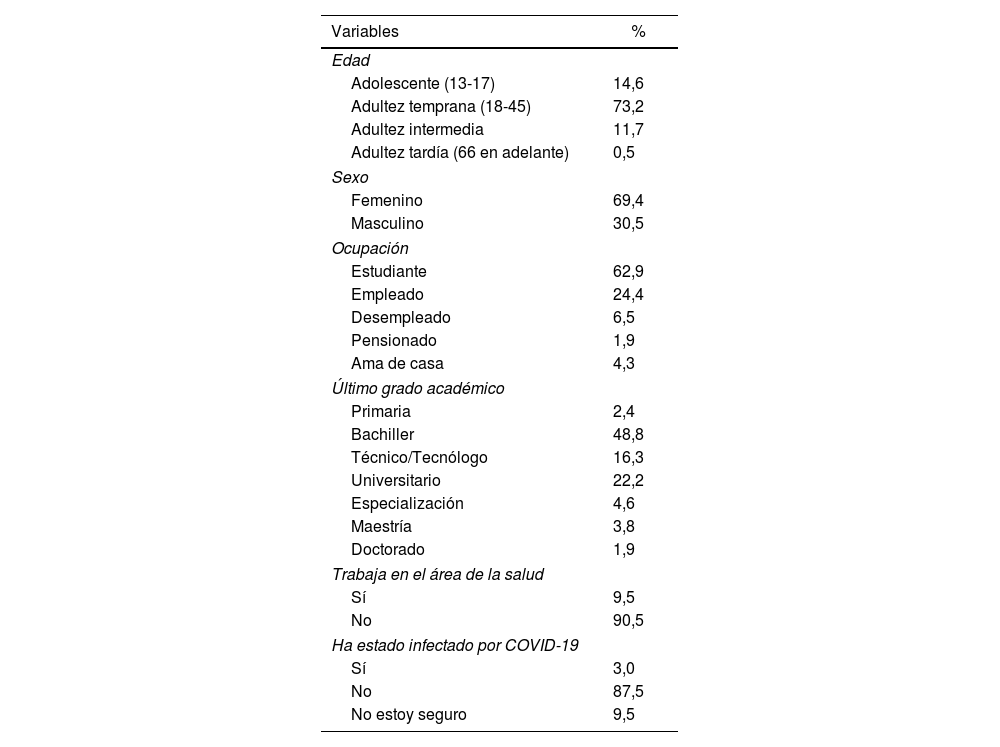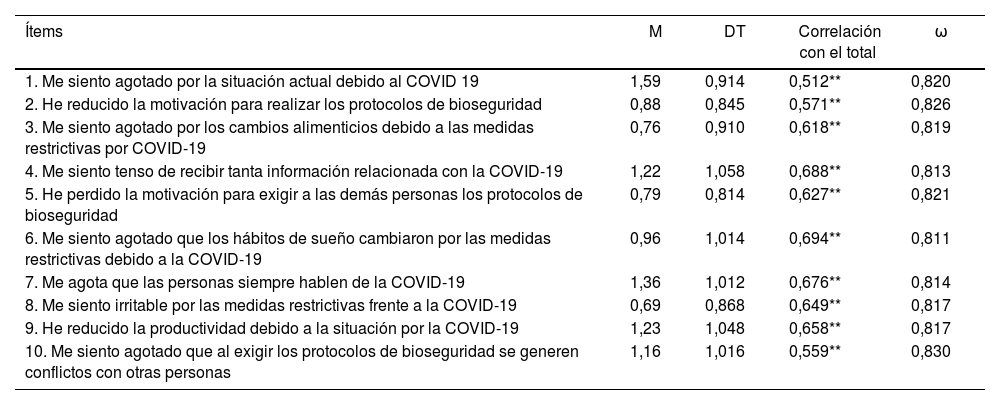La fatiga mental puede ser un resultado no deseado de las restricciones para minimizar el contagio durante la pandemia por la COVID-19. Aun así, en Latinoamérica no se dispone de instrumentos válidos y confiables para estudiar el fenómeno.
ObjetivoAnalizar las propiedades psicométricas de la nueva escala FaCov19 que evalúa la fatiga pandémica en una muestra no clínica.
MétodosEstudio exploratorio con diseño transversal. Se diseña el cuestionario FaCov19 de 10 ítems y se aplica online a 369 participantes de nacionalidad colombiana. Se realizan análisis psicométricos para identificar la confiabilidad y la validez del instrumento.
ResultadosLa confiabilidad del instrumento a partir del Omega de McDonald fue de ω=0,83. En el análisis factorial exploratorio el coeficiente Kaiser-Meyer-Olkin (KMO) fue de 0,84 y la prueba de esfericidad de Bartlett de χ2 1.074,57; p=0,00. En análisis factorial confirmatorio se comprobó el modelo propuesto de la prueba FaCov19 (χ2/gl=2,79; CFI=0,94; GFI=0,95; TLI=0,92; NFI=0,91; IFI=0,94 y RMSEA=0,07).
ConclusionesEl cuestionario FaCov19 presenta una estructura de tres dimensiones, una buena consistencia interna y aceptable validez. El estudio aporta evidencia empírica y metodológica de un nuevo cuestionario para evaluar la fatiga mental por la pandemia de la COVID-19. Es un instrumento adaptable a futuras pandemias, debido a que el fenómeno de fatiga mental prevalece ante estas circunstancias y posiblemente explicaría la causa de la reducción en las medidas de autocuidado.
Mental fatigue may be an unintended result of restrictions to minimize contagion during the COVID-19 pandemic. Even so, valid and reliable instruments to study the phenomenon are not available in Latin America.
ObjectiveTo analyze the psychometric properties of the new FaCov19 scale that assesses pandemic fatigue in a non-clinical sample.
MethodsExploratory study with cross-sectional design. The 10-item FaCov19 questionnaire was designed and applied online to 369 Colombian participants. Psychometric analyses were performed to identify the reliability and validity of the instrument.
ResultsThe reliability of the instrument from McDonald's Omega was ω=0.83. In the exploratory factor analysis the Kaiser-Meyer-Olkin coefficient (KMO) was 0.84 and Bartlett's test of sphericity χ2 of 1074.57; P=.00. In confirmatory factor analysis, the proposed FaCov19 test model was tested (χ2/gl=2.79; CFI=0.94; GFI=0.95; TLI=0.92; NFI=0.91; IFI=0.94 and RMSEA=0.07).
ConclusionsThe FaCov19 questionnaire presents a three-dimensional structure, good internal consistency and acceptable validity. The study provides empirical and methodological evidence of a new questionnaire to assess mental fatigue due to the FaCov19 pandemic. It is an instrument adaptable to future pandemics, since the phenomenon of mental fatigue is prevalent in these circumstances and could possibly explain the cause of the reduction in self-care measures.










